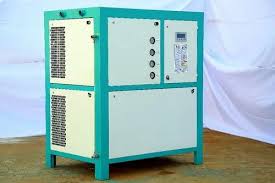Introduction
Medical Grade Chillers in modern healthcare facilities, precision and reliability are paramount to delivering high-quality patient care. Medical-grade chillers play a critical role in maintaining the performance and longevity of essential medical equipment, such as MRI scanners, CT machines, and laboratory devices. By providing consistent and precise cooling, these chillers prevent equipment overheating, ensure accurate diagnostics, and protect temperature-sensitive materials like vaccines and medications. With the increasing complexity of hospital operations, medical-grade chillers have become indispensable for optimizing efficiency, improving patient outcomes, and adhering to stringent medical standards.
Role of Medical-Grade Chillers in Hospitals
Imaging Equipment Cooling:
- Advanced imaging devices such as MRI, CT, and PET scanners generate significant heat during operation.
- Chillers regulate the temperature of these machines to ensure accurate imaging results and prevent overheating, which could lead to equipment malfunctions or downtime.
Laboratory Equipment Cooling:
- Laboratory devices like centrifuges, spectrometers, and blood analyzers require precise temperature control for accurate results.
- Medical chillers maintain a stable cooling environment, enhancing the reliability of tests and experiments.
Surgical Suite and Laser Cooling:
- Surgical lasers and other advanced medical devices used in operating rooms produce heat during prolonged use.
- Chillers ensure consistent cooling, enhancing the safety and performance of these critical devices.
Pharmaceutical Storage:
- Medical-grade chillers play a role in maintaining the required temperatures for vaccines, medications, and other sensitive pharmaceuticals stored in hospital facilities.
- They prevent spoilage and ensure compliance with medical storage standards.
Dialysis Machines:
- Dialysis equipment, essential for patients with kidney issues, relies on chillers to maintain optimal operating conditions.
- Proper cooling ensures efficient performance and patient safety.
Key Features of Medical-Grade Chillers
High Precision and Reliability:
- Medical-grade chillers provide precise temperature control, often with an accuracy of ±1°C, which is critical for sensitive medical applications.
- Advanced control systems monitor and maintain consistent performance even under fluctuating workloads.
Quiet Operation:
- Hospitals require a quiet environment to ensure patient comfort and reduce stress for medical staff.
- Medical chillers are designed with noise-reducing features to operate silently without disturbing the hospital environment.
Compact and Space-Saving Design:
- Space in healthcare facilities is limited, and medical chillers are designed to have a compact footprint.
- Portable options are available to cater to specific room or equipment needs.
Redundant Systems for Critical Applications:
- Medical-grade chillers often come with backup systems or redundancy features to ensure continuous operation, even in the event of a failure.
Compliance with Medical Standards:
- These chillers are built to comply with stringent medical standards, such as ISO 13485 and FDA regulations, ensuring safety and quality.
Benefits of Medical-Grade Chillers for Hospitals
Enhanced Equipment Lifespan:
- By providing efficient and consistent cooling, chillers prevent overheating and wear-and-tear of expensive medical devices, reducing maintenance costs.
Improved Patient Outcomes:
- Properly functioning medical equipment ensures accurate diagnostics and effective treatments, directly impacting patient care quality.
Energy Efficiency and Cost Savings:
- Modern chillers incorporate energy-saving features like variable-speed compressors and eco-friendly refrigerants, reducing electricity costs while maintaining high performance.
Reduced Downtime:
- Reliable cooling systems minimize equipment downtime, ensuring that hospitals can operate seamlessly without interruptions.
Safe Pharmaceutical Storage:
- Precise cooling protects vaccines and medications, ensuring compliance with storage guidelines and safeguarding patient health.
Applications in Hospitals
Diagnostic Imaging:
- Chillers are essential for MRI, CT, and PET scanners, which require precise cooling for consistent imaging performance.
Operating Rooms:
- In surgery, chillers maintain the optimal temperature for lasers and electrosurgical units.
Critical Care Units:
- Life-support equipment, including ventilators and dialysis machines, depend on chillers to function efficiently.
Pharmaceutical and Laboratory Areas:
- Medical-grade chillers ensure the proper cooling of laboratory equipment and the storage of temperature-sensitive medicines.
Conclusion
Medical-grade chillers are the backbone of temperature control in hospitals, supporting the smooth operation of diagnostic, surgical, and pharmaceutical processes. Their ability to ensure equipment reliability, safeguard critical supplies, and enhance operational efficiency makes them a vital component of modern healthcare systems. By investing in advanced, energy-efficient chillers, hospitals can reduce equipment downtime, improve patient care quality, and achieve long-term cost savings. As the healthcare industry evolves, the demand for robust and innovative cooling solutions will only grow, solidifying the importance of medical-grade chillers in sustaining excellence in patient care.

